Camping is a recreational outdoor activity where campers headed out for refreshment either for short-term, or long-term. Typically, campers leave the hustle and bustle city to go back to the wilderness.
Either they stay in the tent or recreational vehicle during the camping period. The objective is to get refreshed and make a good relationship with nature. And there are various forms and styles of camping out there.
Do you know what are the types of camping? Well, you’re in the right place to know this. With traditional camping, many new forms of camping have come around. Camping statistics show the number of campers is also increasing exponentially as time goes on.
With the development of handy camping gear and well-developed campsites, different types of camping have emerged in recent years that provoke campers to go outside. And each camping style comes with new tastes and funs to enjoy outdoor life from a different perspective.
You may hear about various camping names that actually came after their transportation type and living method. And today we’ll be explaining many modern and traditional camping types. Stay tuned!
Different Types of Camping with Their Pros & Cons
It’s hard to say in a few seconds that how many types of camping are there. With the development of technology, many modern camping styles have developed over time. As a result, the lists of camping types and styles are getting larger.
However, we plan to discuss here 28 most amazing and basic types of camping here. Let’s dive in to reveal different styles of camping!
Various Kinds of Traditional Camping
1. Tent Camping
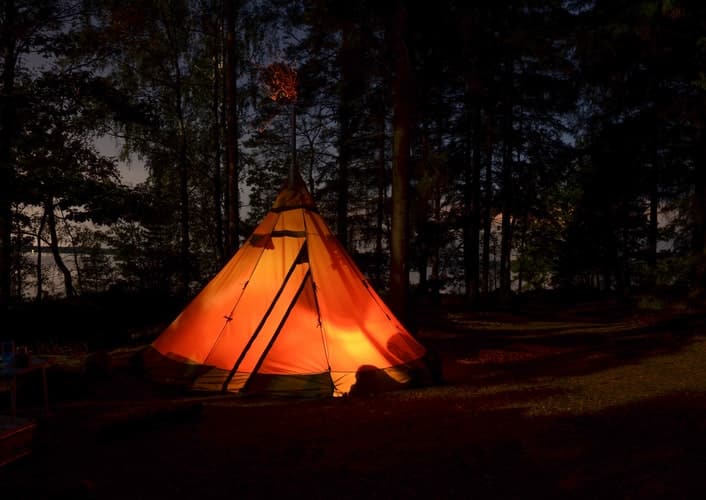
When we discuss camping, the picture that came to our mind is- few people are building a tent for spending a few days. Tent camping involves tent setting either in a private or public campground, bringing camping essentials, and enjoying a campfire at night. According to the North American Camping Report, more than 59% of campers accommodate tent camping.
Tent camping is a primary, traditional, and most popular type of camping. This is a great option for beginners and low-budget campers. You can also choose from the numerous tent types for different situations. Tent camping is pretty well for the solo camper, small-family, or large family. Securing tents against high wind, winter, rain, etc, you can get a great outdoor experience.
Read: Tent terminology
Pros:
- Budget-friendly option
- Perfect for all seasons
Cons:
- Can be uncomfortable to sleep
No products found.
2. Backpacking
Backpacking or trekking is an amazing camping type that is actually an independent trip through nature. Backpackers carry their necessary gear in the back while staying outside for a couple of days. This may include hiking with camping in the backcountry. Backpackers usually prefer packing the ultralight gear.
If you want to go out backpacking, you have to be capable of carrying enough weight in the back. Usually, backpackers hike in the daytime and assemble things to sleep outdoor. This camping will improve your level of self-sufficiency and stresses handling capacity.
Cons:
- Only strong persons can do this
3. Survivalist Camping
Out of the different kinds of camping, survival camping is quite special wild camping. When you have nothing in the wilderness but have to survive in this situation. We all are familiar with the “Bear Grylls” activity that is the perfect example of survival camping. This teaches a camper how to survive in the toughest situation.
Those who want to go survival camping must be skilled enough otherwise they may fall into danger. To survive there, you have to do many tasks such as fishing, hunting, trapping, and gathering fruits and edible plants, and many more.
Pros:
- Teaches survival technique
- Help to go back in roots
Cons:
- Chances of falling into danger
4. Primitive Camping
This is one of the toughest camping types where you don’t have proper amenities such as pure water, bathroom, shelter, or first aid supplies. Usually, campsites for primitive camping are situated in remote areas in uncomfortable situations. That’s why sometimes it is called backcountry camping.
Nowadays, many parks have designated areas for primitive camping. But make sure you have permission to camp these campsites. While preparing for primitive camping, don’t forget to bring necessary supplies like food, a tent, and a water supply.
Pros:
- Provide real camping taste
- Make you self-sufficient and skilled
- Cheaper than modern camping types
Cons:
- Won’t offer luxury
- Have to prepared for adversity
5. Adventure Camping
This is a popular outdoor pursuit that includes traveling with backpacking gear. Adventure campers go out with a group of people for a few days. The campsite must be a stationary base camp that is inaccessible by vehicles. To make a successful adventure camping, skilled leadership is mandatory.
Adventure campers have to do lots of physical activity than most of the other campers. Usually, adventure campers have a great fascination with hiking, fishing, boating in the daytime. Besides, they take a rest, prepare food, and enjoy the wilderness at night using some optical devices. Coleman Sundome is a good tent for adventure camping.
Pros:
- Improve social responsibility
- Provide new experiences
Cons:
- Sharing may be gross
6. Backyard Camping
Camping in the backyard might be the best option for camping beginners. When you don’t have enough time to go miles away, then this can be great fun for the whole family. Backyard camping is less stressful and affordable than outdoor camping. This will grow camping skills for your kids’ such as tent set up, sleeping outside at night, etc.
You can surprise your partner with a romantic camping date through backyard camping instead of the usual dinner and sleeping in the bedroom. If you are planning camping in the backyard, make sure your living location doesn’t have any restrictions for it. Kids use the fun tents in backyard camping.
Pros:
- Kids can easily gather camping experience
- Inexpensive and free from traveling hassle
Cons:
- Not recommended for small backyard
7. Hammock Camping
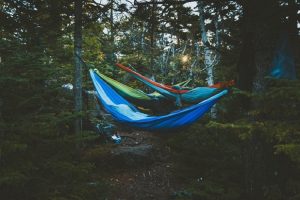
If you can’t afford lots of gear for camping then hammock camping is a quite good option. You can set up a hammock easily with the trees. This is almost zero hassle camping. There is no worry about tent preparation and ground selection. Usually, backpackers and bikers prefer this camping very much.
The hammock provides comfortable sleeping than usual tent camping as you can swing it when needed. When buying a hammock, make sure it can withstand your weight. Sometimes you may buy rain cover, and mosquito net, separately.
Pros:
- Budget choice camping
- Almost no time set up
- Good for the solo camper
Cons:
- Climbing might be problematic for kids
- Rain or snow may be dreadful
8. Ultra-Light Backpacking
This is the advanced level of backpacking, where campers carry only a few life-saving items whilst eliminating the weight as much as they can. The reason behind this type of camping is to make the relationship with nature without amenities and luxuries. Exhibition campers like this camping style.
Generally, ultra-light backpackers carry around 12 to 24 pounds including water, food, and fuel. Many pro campers believe, whatever the ultra-light backpackers carry must have 3 functions minimum so it is worth the weight. The pop-up tents are great for lightweight backpacking.
Pros:
- Ultra-lightweight camping
- Almost hassle-free
Cons:
- Need to be choosy while packing
9. Mountain Camping
Camping in the mountain is another astounding sort of camping. Mountain campers love hiking during the day and camping at night. The major consideration is the rock and snow in mountain camping. Building a tent near the rocky mountain is relatively hard than the usual tent setting.
Mountain camping maximizes outdoor fun but might be challenging if there is snow everywhere. However, this will allow campers skiing, snowboarding, climbing, and many wonderful activities.
Pros:
- Get closer to high hill mountain
Cons:
- Don’t make a tent in the steep
10. Beach Camping
Sleeping to the beach waves is a cool idea on hot summer days. This is an incredible experience to stay on the sea beach and seeing sunrise to sunset. You can explore there in the daytime. Besides, gaze at the stars, and moon on a cool night using a telescope.
Although, all the beaches won’t allow to camp there for numerous reasons. Still, several beaches in the USA and other countries allow set up camp on the beach at night. To know about the tips of beach camping check this out.
Pros:
- Lots of fun on the beach
- Opportunity to see sunset and sunrise
Cons:
- High temperatures may harm the skin
11. Canoe Camping
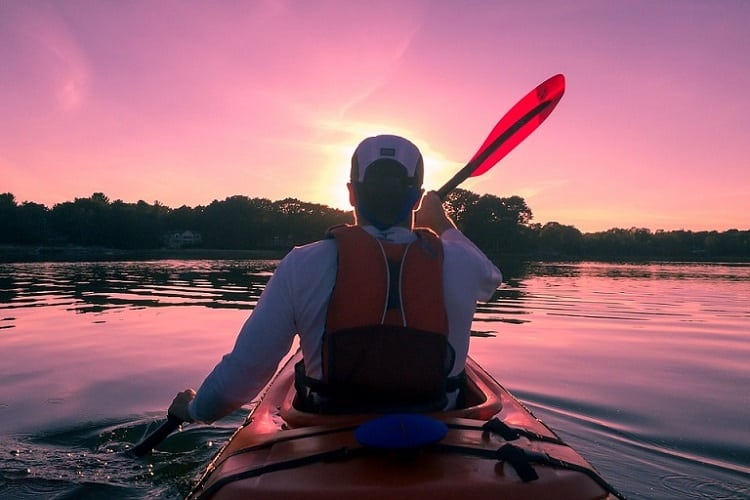
Kayaking or canoeing is a great way to enjoy the wilderness especially for those places where hikers can’t reach by foot or cars. This adds water traveling with nature viewing. At the same time, you can also do fishing. Canoe or kayak camping is most suitable for a group of people.
Weight carrying is not a big deal in kayaking still don’t bring unnecessary items. Sometimes heavy rainfall and a water stream might be dangerous for canoeing. Before kayaking, check the weather forecast to avoid undesirable scenarios.
Pros:
- Great water traveling
- No weight carrying hassle
Cons:
- Newbies shouldn’t go alone
12. Cabin Camping
Cabin camping might be a good accommodation for those who haven’t much interest either in tent camping or glamping. Unlike glamping, it’s a minimal amenities camping that has no kitchen or bathroom. However, there is a roof over the top, so beginners find this better than tent camping.
Most established campgrounds have this facility like state parks or national parks. But you have to bear a small fee to use this cabin. While camping in a cabin, cabin campers will be inspired by other campers and gradually show interest in tent camping or other popular types of camping.
Pros:
- Recommended for beginners
- Limited facilities
Cons:
- Have to book in advance
Read Also: How to make campsite snakes free?
13. Free Camping
Most campers love camping without any charge. So they search for fare-free campgrounds. Luckily there are lots of free campgrounds in state parks and national parks. According to the North American Camping Report of 2019, more than 40% of campers went out for free camping.
The perks of free camping are that you can manage your camping at a minimum cost. So, this might be helpful for those who are budget constraint or camp throughout the year. But these campsites aren’t well-developed and away from the city. Most free campgrounds are BLM lands, grasslands, or national forests.
Pros:
- Cost-efficient camping
- No hardcore campground rules
Cons:
- Not well-developed
14. Private Camping
Private camping is another well-known style of camping. In this camping, campers pay private landowners for using the campgrounds and the existing facilities. Landowners do this for profit or as their personal hobby. On average, more than 25% of campers spend their time in the private landowners’ campgrounds. This type of camping is a good way to avoid mass campers gathering.
Most landowners have some specific rules to camp in therein. Several landowners develop the campgrounds for camping facilities such as water, fire pits, electricity, bathroom, parking lots, etc. But others don’t offer such facilities, they only charge for the bare land to camp wildly. If you run a Google, or Bing search with your location for “RV campground near me”, most likely you will find lots of options.
Pros:
- Within driving distance
- Well maintained campground
Cons:
- Not all have great facilities
15. Dry Camping
Dry camping is off-grid camping without hookups (electricity or water). It is the practice of going camping in the RV, car, or truck. When you do camping in a forest or national park it is sometimes referred to as dispersed camping. Most of the public and private land areas are open and free for dry camping.
Boondocking is another term related to dry camping, although there is a small difference between them. Both of them are no hookups camping, but boondocking is always staying outside the typical campgrounds. Whereas dry camping involves both traditional and outside campground camping
Pros:
- Free and less restricted
- Cheap camping
Cons:
- Challenging for newbies
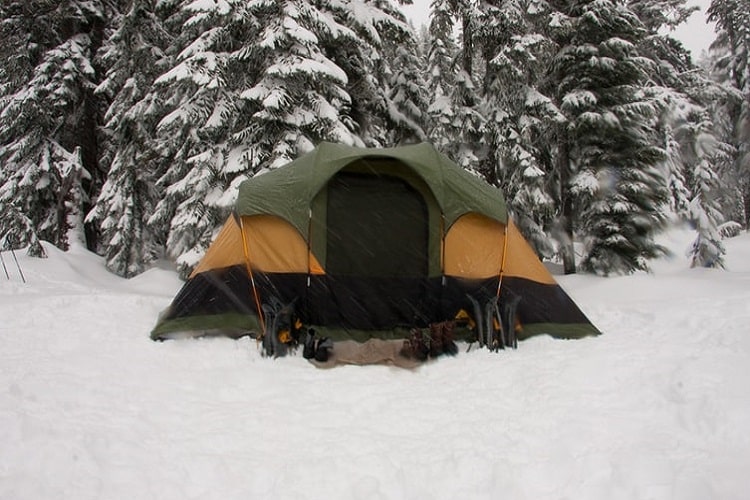
16. Winter Camping
When the temperature drops into single-digit or below freezing, crazy campers step out for winter camping. If you plan to go winter camping, you must be skilled enough otherwise you may fall into trouble. Winter camping includes snowboarding or backcountry skilling that’s an amazing experience.
But it can be challenging if you don’t prepare well. Of course, the key thing is staying warm in the snow. A winter sleeping bag is an essential item for winter camping. Proper knowledge and skills are required to deal with snowy landscapes.
Pros:
- Opportunity for enjoying the winter
- Improves low-temperature adaptability
Cons:
- Not recommended for children and older people
Modern Camping Types
17. Bicycle Camping
Bike camping is a great adventure for those who love to camp without much environmental trouble. This camping will allow you to access areas where car or RV campers can’t reach. So, bike campers can get the wilderness taste like backpackers.
This camping style is popular among enthusiasts teenagers. Bikers usually prefer lightweight gear and quality bikes. With camping experience, bike riding will make you fit and help you to be active outdoor.
Pros:
- Lots of freedom
- Almost hassle-free
Cons:
- Might be dangerous for vertical areas
18. Motorcycle Camping
Motorcycle camping is almost similar to bike camping. But this adds some extra benefits to the bike. Motorcycle makes it easier to travel and carry necessary gears for long distances without significant physical stress. No worry how the steep or trail is, you can simply overcome them gearing up the motor.
If you have several motorcyclist friends, you can easily go away from hustle and bustle city to the wilderness. But don’t forget to take your necessities in the luggage with enough fuel. The essential items like a tent or hammock can make your trip much more enjoyable.
Pros:
- Easy transportation
- Adventurous trip
Cons:
- Rain or snow may harm the motor
19. Glamping
The word glamping is the combination of two words glamorous and camping. It is a luxurious and comfortable camping option like a home or hotel. You will get everything within your hand neat and clean. There is much more availability than tents such as tipis, lodges, treehouses, and cabins.
While traditional campers will be busy building a tent and collecting food, glampers will get the chance to enjoy the wilderness. In this way, glampers get good outdoor results in several ways. Many glampers love reading, writing, photography, or painting.
Pros:
- Luxurious accommodations
- Hassle-free trip
Cons:
- Expensive camping
20. RV Camping

Recreational vehicle or van (RV) camping is another favorite type of camping, especially for seniors. The vehicle will assist you to reach the campsite shortly. It is sometimes called a “motor home”. RV camping is perfect for those who love luxurious camping. No matter how the weather condition is, you can camp in the van.
While traveling in the vehicle you can park anywhere you want. This allows camping facilities as well as accommodations of hotels. Almost all your necessary items are available in the van. RVers might be a full-timer, part-timer, or snowbirds.
Pros:
- Camping in any weather condition
- Comfortable camping
Cons:
- Not allows going tough terrain
- Expensive option
21. Car Camping
Car camping is going to the campground and sleeping there in the car. Usually, the wagon-type car will allow sleeping the car by folding down the seats. However, you can also bring a tent to sleep in. While camping in the car, you should carry out the cooking items and other essentials.
This camping is perfect for a couple or a small family. Although this is not glamorous camping, yet it’s an opportunity for those who love camping but don’t manage time for several days.
Pros:
- Lovely camping for a couple
- Almost zero cost camping
Cons:
- Not for a group of people
22. Overlanding
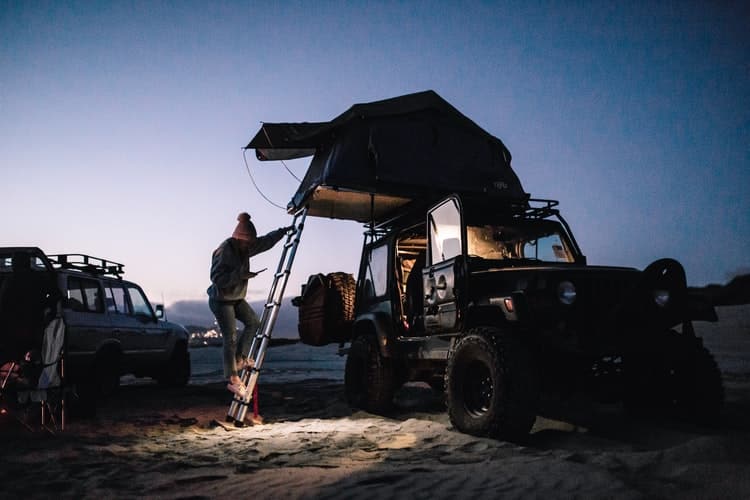
Overlanding is a unique adventure that blends camping and off-roading. The journey is the primary goal of this adventure. It allows campers to travel vehicles independently in a four-wheeled car for the remote destination. The journey may last for a day, a couple of days, a few weeks, months, even years.
Usually, there is a folding tent on the roof of the overland vehicles. That’s why this type of camping is also known as a car-top tent, or rooftop tent.
Pros:
- Opportunity to explore independently
- No need to carry equipment in the back
Cons:
- Expensive than the usual camping
Several Special Camping Types
23. Reenactment Camping
Reenactment or history camping is a wonderful way to learn history. This is popular amongst history lovers. Every year many people seek primeval technologies and lifestyles such as the Wild West, American Civil War, or the Medieval Times. It teaches how to handle the situation using the old techniques if modern gear fails.
In this camping, campers use specific gear and techniques to a certain ancient age. They also dress up like the reenacted people. Usually, history buff people around the world organize events and enjoy this excellent camping fun.
Pros:
- Demonstrating the historical lifestyle
- Participation in a good gathering
Cons:
- Not all reenact are suitable for all campers
- Might spend lots of money
24. Themed Camping
Typically, young people arrange themed camping focusing on any event or important day. Campers decorate the campsite with a particular theme in this camping. For example, when young men get married, they want to celebrate the honeymoon or wedding reception party in a unique way to end up their bachelorhood.
The fans of Game of Thrones or Pirates of the Caribbean decorate the campsite with Dragons and Knight King, or Jack Sparrows hat. Themed camping is also seen during Christmas, Halloween, Memorial Day, and so on. If you want to commemorate Memorial Day then decorate the campsite with the American flag or use military-themed items.
Pros:
- Allow decorating with the favorite theme
- Amazing experience
Cons:
- Expensive type of camping
25. Festival Camping
Camping at the festival is great entertainment for those who love to enjoy the full weekend. Festival camping is arranged during the festival like a music festival. Massive crowds gather together and enjoy their favorite bands outdoor. To get the maximum fun, you have to pack lightly with the necessary camping gear.
Taking shower is a problem in festival camping as there are lots of people. However, shower trailers can resolve the problem. Some of the festival campsites allow buying hot food and drink. After going to the campsite, check out the rule therein. To share wonderful moments with your friends take lots of photos on your smartphone.
Pros:
- Good for community build-up
- Non-stop weekend fun
Cons:
- Stealing is common
- Noisy environment
26. Workamping
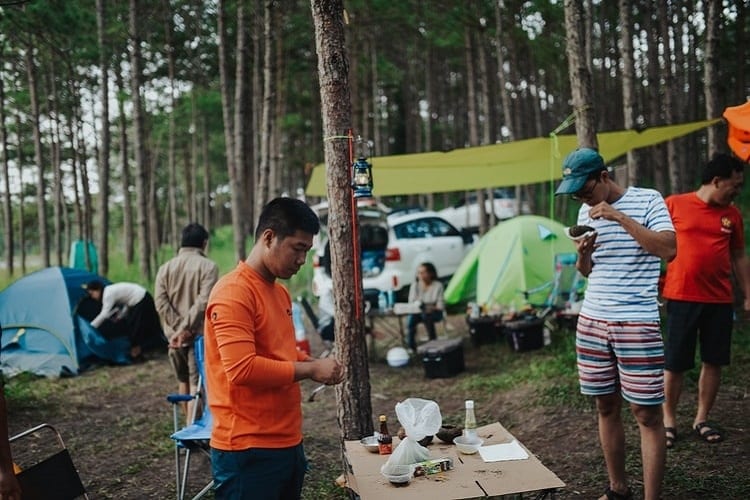
Workamping is a unique style of camping that involves a combination of work and camping. Sometimes this is called labor camping. Workampers can work in the RV or tent camping as a paid or volunteer job. Generally, they also get a free campsite as compensation. Workamping is very popular among retirees.
Many resorts and private RV parks appoint workampers for various jobs such as maintenance, guest checking in or out, docent service, grounds keeping, cleaning, firewood sales, etc. There are different types of workamping and most works are seasonal.
Pros:
- Paid and volunteer work facility
- Camping opportunity without fare
Cons:
- Uncertain job
27. Permanent Camping
There are some outdoor lovers who left their house and live off-grid camp permanently. This kind of camp is either very simple or complicated. However, most permanent campers place their camp on a strong platform. You have to make the roof, sidewalls, and other parts strong that can sustain harsh weather.
Wall tents might be a good choice in this regard. You can also buy such kinds of livable tents. Several permanent campers also make architecturally designed camps. Nowadays some RVs allow living campers lifetime at a reasonable price.
Pros:
- Wild lifestyle
Cons:
- Not recommended for beginners
Non-Recreational Camping
28. Refugee Camps
While most of the above types of camping are performed from passion and outdoor fun, but this type and style of camping is basically a humanitarian shelter to the refugees worldwide. This is a temporary shelter for homeless people who are fled or been displaced from home due to war or any other natural disaster.
In 2019 there were more than 79.5 million refugees worldwide, according to the UN refugee agency survey. So, their shelter is essential, and refugee camps come in handy in this way. Most of these camps are run by governments, international organizations, and non-governmental organizations.
Pros:
- Ensures basic human needs of refugees
Cons:
- Not enough amenities
Camping 101
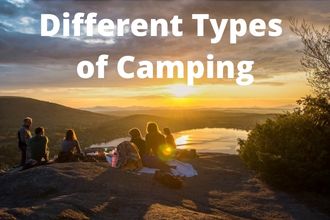
Benefits of camping
Camping is not only a fun activity, but it also has lots of health as well as mental benefits. While camping, you’re very close to nature. Nature will give back lots of pleasure and you can feel the importance of natural elements.
Breathing fresh air, your stress level will be reduced a lot and your heart will be filled with joy. Sleeping in the outdoors with fishing, hunting, and tasting wonderful foods are also awesome experiences.
It will teach you how to cope up with new challenges in different situations, which will enhance your skills. Moreover, it’s the best time to share with others and develop social knowledge.
And carrying the necessary items like good binoculars, fishing rod, hunting bow, etc, your excitement will boost a lot.
Camping Checklist
Camping essentials vary with the type of camping you are going. In general, some of the essential items for camping are shelter or tent, sleeping bag, kitchen items, toiletries, sleeping bag, first aid, and many more.
Also Read: Beach camping checklist
Frequently Asked Questions (FAQs)
Q: List a few of the modern types of camping?
Answer: Some of the popular modern camping styles are RV camping, glamping, Overlanding, car camping, etc. If you want to learn camping basics these forums will help you a lot.
Q: Mention some traditional camping names?
Answer: There are lots of classical camping styles such as tent camping, backpacking, hiking, kayaking, survival camping, winter camping, and so on.
Q: What is the difference between glamping vs camping?
Answer: Camping is living in tents and enjoying the wilderness. Usually, campers need the basic gear and amenities such as a tent, sleeping bag, first aid kit, cooking items, etc. On the other side, glamping is one kind of camping that includes luxurious items of home or hotels to make camping trips comfortable.
Glamping is expensive than camping, but ensures an easy and comfy outing. If you are not a budget constraint person and don’t interested to be a DIYer at the campsite, then glamping is a perfect choice.
Camping provides more lovely experiences as campers do their works own. Going close to nature, you will get the real feeling of wilderness. Thus, camping will improve your skills and experience a lot.
Q: What are the different types of campsites?
The campsite is simply the place where campers set up their tents or RV vehicles for camping. Different popular campsites are wild campsites, backcountry campsites, class A, AA, AAA, B campsites, individual campsites, family campsites, wooded campsites, caravan club campsites, premium campsites, and so on.
Most of the campsite names are self-explanatory, however, you can check this for more details.
Q: What are the different types of camper vans?
Answer: Different types of RVs include motorhomes, trailers, toy haulers, and truck campers. Out there, three different types of motorhomes are class A motorhomes, class B motorhomes, and class C motorhomes. Several RV trailers are travel trailers, fifth-wheel trailers, Pop-Up trailers, hybrid trailers, and so on.
Final Verdict
Now, you know the different types of camping with their advantages and disadvantages. This is a basic guide for camping enthusiasts. Most likely, you have already decided which camping you love most and plan to go on the upcoming getaway.
Modern camping offers a variety of ways and plenty of facilities to enjoy the wilderness. We hope, more amazing camping will come soon. Whatever camping you choose, leave no trace on the campsite.
If you find this article helpful, please share it with your friends. And let us know your best-preferred camping type or share your camping story with us. Happy camping!

Joe is the founder and chief editor of PickOutdoorGear. He loves hiking, camping, fishing, hunting, and other outdoor activities. He will share his knowledge and experience here that he learned and still learning from the wilderness.

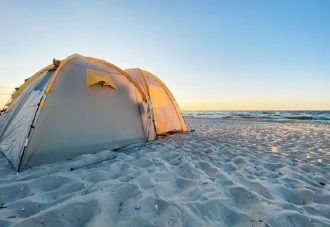
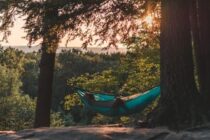
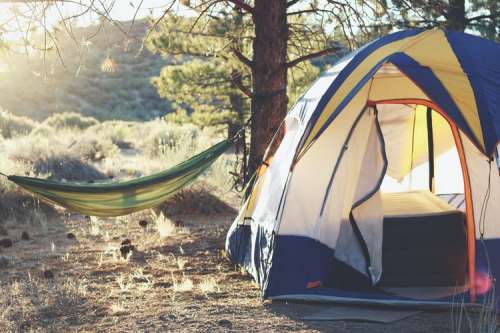
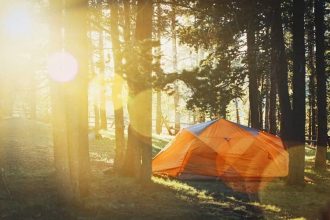
The best article on camping types that I have ever seen!
Thanks for adding such wonderful tips! We will cover the fishing topic soon. If you wanna submit a guest post in English, let us know.
Hello Kate,
You are welcome! Please check your mail for our guest post guidelines.